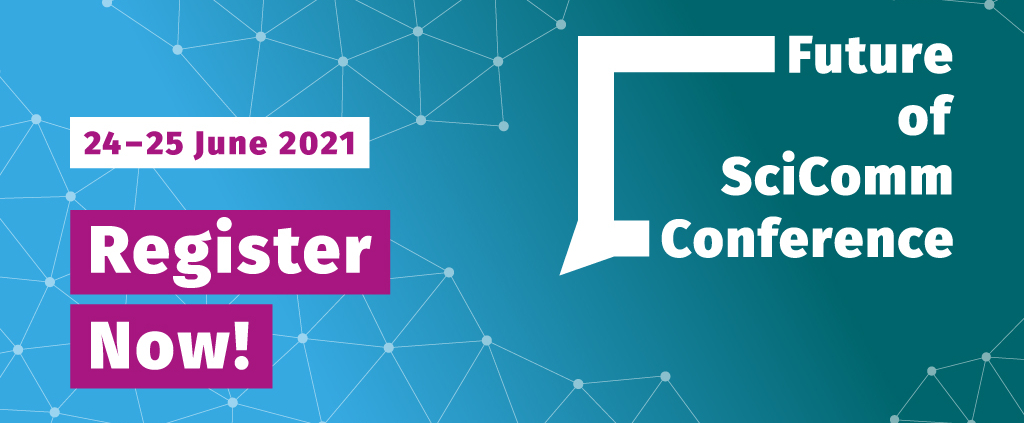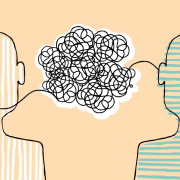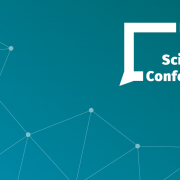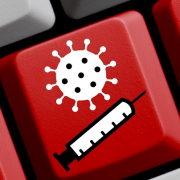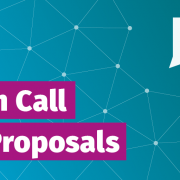Registration for the Future of Science Communication Conference is open
Together with Wissenschaft im Dialog, we are happy to announce that registration for the Future of Science Communications Conference is now open! The event will take place online on 24 and 25 June 2021. Attendence is free of cost, open to all and registration will be open until 18 June, 2021.
The multidisciplinary conference will bring together outstanding researchers and practitioners, reflecting the state of the art in the field of science communication and discussing the further development of the field. Its primary goal is to provide an impetus for stronger networking and further transfer activities in science communication.
Funded by the German Ministry for Education and Research, the digital conference is free to attend and will offer interesting keynotes, panels, workshops and lightning talks featuring researchers and practitioners from various European and international institutions. The topics to be discussed include:
- Trust in Science
- Science and Politics
- Science Communication in a Digital World
- Crisis Communications
- Target Groups of Science Communication
With the full programme now published, we are looking forward to keynotes from Mike Schäfer, Nicole Grobert and Cissi Askwall.
ALLEA is particularly excited to highlight three formats where our projects and partners are especially involved. The workshop Communicating microplastics risk: Balancing sensation and reflection is organized by colleagues at SAPEA and explores a real-life case of how SAPEA communicated the absence of evidence of risk from microplastics to human health after an evidence review report. The workshop Experiments to fight science disinformation online, lead by some of our PERITIA colleagues, will analyse the problem of scientific disinformation and look at strategies to contrast it based on evidence from experiments in social and behavioural sciences.
Lastly, Prof. Dr. Antonio Loprieno, ALLEA President, will be moderating a panel discussion on Science and Politics, featuring Prof. Dr. Janusz Bujnicki (International Institute of Molecular and Cell Biology in Warsaw), Prof. Dr. Ortwin Renn (Institute for Advanced Sustainability Studies Potsdam) and Dr. Bella Starling (Central Manchester University).
To view the entire programme with all keynotes, panels and other formats, visit the conference plattform: https://future-of-scicomm.converve.io/
About the conference
An increasing scientification of societal discourses, not only against the background of the corona pandemic, indicates that the communication of scientific knowledge will be even more important in the future. While the exchange of experience within practitioner communities is working better and better at the national and, increasingly, at the European level, the academic discipline of ‘science of science communication’ is only slowly emerging in the European research landscape. Hence, there is a lack of systematic, interdisciplinary overviews of research questions and areas. In addition, the transfer between research and practice in this field is still at a relatively low level. This lack of systematic transfer and networking leads to a lack of practical orientation in research as well as a lack of evidence orientation in the practice of science communication.
This is where the Future of Science Communication conference sets in: Its primary goal is to provide an impetus for stronger networking and further transfer activities in Science Communication. Only effective and evidence-based science communication can help to tackle the challenges in the relationship between science-public-media-politics in the coming years on the European level. We need science communication research that is well connected at the European level, systematically conducts excellent research, and promotes its transfer into practice.
Moving Research and Practice Forward
Which topics in science communication are considered to be well researched? What are the recommended courses for action in science communication practice and science policy? And how can the exchange and transfer between research and practice be better and more sustainably designed? Participants will address these overarching questions in high level panel sessions as well as in in-depth workshops, while discussing the latest findings on questions of trust in science, dealing with fake news, crisis communication, citizen science, and more. Furthermore, our speakers will use case studies on specific controversial scientific topics such as artificial intelligence, genome editing, climate change, or vaccinations to illustrate and discuss learnings from research and practice of science communication.
Over the next weeks, we will be highlighting and showcasing some of our speakers, panellists and workshops on our social media so be sure to follow us on LinkedIn and Twitter.
For a sneak peek at the programme and to register for the event, head to our website!

